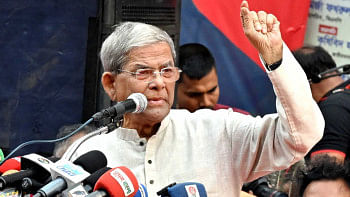Include private sector in tariff talks

We share experts' and businesspeople's concerns about the urgent need for measures not just to counter the likely impact of the Donald Trump administration's tariffs but also to ensure that our economic engine runs at a better pace in a changing market reality. A little over two months remain before the 37 percent additional tariff on all Bangladeshi goods exported to the US takes effect. Unless reversed or delayed again by Trump, Bangladeshi garments—our main export to the US—will become more expensive in American markets. In fact, one exporter at a recent roundtable has said they are already receiving pressure for discounts from buyers to absorb the tariff burden.
While the government has taken some steps in this regard—including offering duty-free benefits to more US imports and sending a delegation to negotiate with the US trade office—several experts and exporters have stressed the need for broader and more strategic actions. This daily, too, has previously emphasised the need to diversify our export markets and reduce our overreliance on a single sector, while improving productivity and addressing internal inefficiencies. Even within the RMG sector, there is a need to move towards high-end products and further explore regional markets. Strengthening our "Look East" policy by considering markets like China and Korea could also serve as an alternative strategy.
We must also intensify diplomatic efforts, including by appointing experienced US-based lobbyists. While past governments often used lobbyists primarily for promotional purposes, the interim government must consider appointing a lobbyist group with expertise in trade and business as well as connections with the Trump administration. Moreover, any delegation negotiating trade and tariff issues must include private sector leaders and economists with sound trade knowledge—not just government officials or diplomats.
On the domestic front, we should focus on reducing production costs, but not by slashing wages. Exporters have rightly pointed out the burden of high gas and electricity prices as well as the lack of uninterrupted supply. Proper energy and power policy interventions are needed to address this crisis. Removing logistical bottlenecks and improving cargo-handling efficiency at sea and airports will also help exporters ensure timely deliveries, giving them a competitive edge.
However, policy recommendations such as increasing imports from the US, devaluing currency, or offering more subsidies and incentives to RMG exporters should be pursued only if they serve the broader economy. Instead of taking ad hoc measures driven by narrow interests, the government should consider forming a committee composed of both public and private sector representatives to formulate cohesive strategies. No commitments should be made at international forums without consulting such a committee. Ultimately, we must not enter into disadvantageous deals just to avoid short-term losses.

 For all latest news, follow The Daily Star's Google News channel.
For all latest news, follow The Daily Star's Google News channel. 







Comments